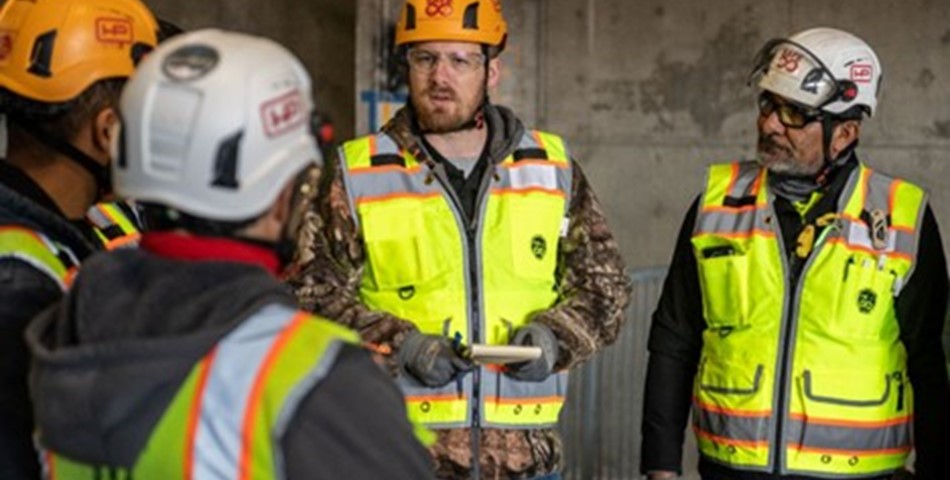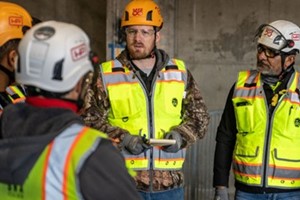A staggering statistic, one in five U.S. adults experience mental illness annually. In industries like construction, where safety risks are present daily, taking steps to provide resources and support for individuals to take their mental health seriously is critical. As the industry advances physical safety protocols, mental health and wellness are also becoming a key area of focus for construction professionals.
Mental health in the industry
While further study is underway to assess contributing factors, it is known that the physical demands on a craft professional can take a noticeable toll on individual workers and can heavily impact the mental health of craft workers. According to a 2021 report by the Bureau of Labor Statistics, 94% of workers in the construction and extraction professions have outdoor exposure, and 62.2% of workers in the industry are exposed to heights more than five feet off the ground. If not controlled, the hazards of the workplace can lead to physical injury or loss of coworkers and friends, causing mental health stressors on an individual.
It is believed that mental illness and physical injuries lead to high rates of alcohol and substance abuse in the industry. The Substance Abuse and Mental Health Administration collected data on drug abuse and found that in the construction industry, the rate of substance abuse is almost double the national average. The study found 15% of workers in the construction industry are impacted by substance abuse with 8.6% of people as the national average. This is also true of alcohol abuse where 12% of workers in the industry deal with an alcohol abuse disorder while the national average is 7.5%.
The impact of mental illness compounded with substance abuse leads to a high rate of suicides in the industry, specifically among men. A CDC report using the 2016 National Violent Death Reporting System (NVDRS) to analyze suicides across industries found suicides among males have one the highest rates in the construction and extraction occupations.
Mental illness does not just impact the individual, it impacts everyone around that person, family, friends, coworkers and anyone else who interacts with that individual daily. The long-term impact can have serious implications for those relationships.
Recognizing and normalizing mental health
Normalizing conversations on mental health in the industry can lead to destigmatizing those workers affected. The construction industry, in many ways, is still stuck with the mindset that talking about stress, anxiety and other mental health issues is a weakness. This mindset aligns with the idea that workers should be tough and able to deal with those feelings without help. This mindset is detrimental to the health and wellness of everyone on a job site. When this conversation shifts to recognizing and supporting individuals suffering from mental illness, the industry starts to become a safer environment for everyone.
“We have to keep reminding everyone that mental health issues in the industry are really common. The proportion of individuals impacted because of factors outside of the job site, incidents on the job site, elements of the job site, etc. compounded by substance abuse is significant,” said Kathi Dobson, Safety Director, Alberici Constructors.
How can companies support mental wellness?
Currently, many organizations offer support through EAPs, but there is more that can and should be done. Leaders can prioritize creating a safe space and a culture of trust and leading by example by prioritizing their own mental health.
“Everyone’s mental health is highly unique to themselves with no singular journey. People cope in different ways. It’s important for organizations to have space for every individual. You can’t force someone to take care of mental health. You can help support them,” Laurie Sharp-Page, Founder & CEO of Flourish Psychotherapy and author of Conscious Coping.
According to Sharp-Page, companies can support their employees by creating a framework for how the team talks about mental health and creating clear policies on mental health days within their organization. The framework can include giving employees the space to have their feelings and to cope with feelings by providing resources and support. Policies should, at a minimum, acknowledge that prioritizing mental health is encouraged.
Mental health resources
In the last few years, the Construction Safety Week team has put a strong focus on improving mental health and providing resources to companies and individuals. The annual themes for the campaign have centered on the importance of both physical and mental wellness in the workplace, how to create a safe and supportive environment for our workers and opening up conversations that help normalize the topic of mental health within the industry. In 2022, the executive team created a free, downloadable mental wellness field guide offering resources to support craft workers in the industry.














